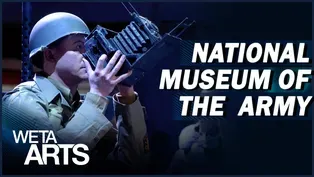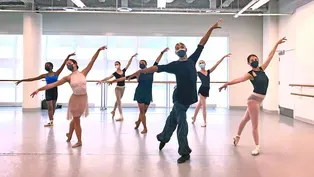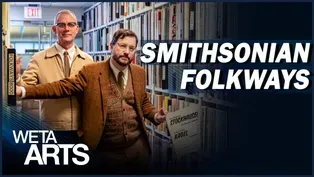
Washington School of Ballet Adult Program
Clip: Season 11 Episode 3 | 8m 42sVideo has Closed Captions
The Washington School of Ballet offers open classes for adults at all skill levels.
Want to try ballet? The Washington School of Ballet offers open classes for adults at a variety of skill levels, in addition to their ballet training programs for younger dancers. Led by world-renowned dancer and choreographer Miya Hisaka, the adult ballet program offers an inclusive environment that encourages everyone to pursue their love for dance, regardless of age, background, or body type.
Problems with Closed Captions? Closed Captioning Feedback
Problems with Closed Captions? Closed Captioning Feedback
WETA Arts is a local public television program presented by WETA

Washington School of Ballet Adult Program
Clip: Season 11 Episode 3 | 8m 42sVideo has Closed Captions
Want to try ballet? The Washington School of Ballet offers open classes for adults at a variety of skill levels, in addition to their ballet training programs for younger dancers. Led by world-renowned dancer and choreographer Miya Hisaka, the adult ballet program offers an inclusive environment that encourages everyone to pursue their love for dance, regardless of age, background, or body type.
Problems with Closed Captions? Closed Captioning Feedback
How to Watch WETA Arts
WETA Arts is available to stream on pbs.org and the free PBS App, available on iPhone, Apple TV, Android TV, Android smartphones, Amazon Fire TV, Amazon Fire Tablet, Roku, Samsung Smart TV, and Vizio.
Providing Support for PBS.org
Learn Moreabout PBS online sponsorshipWhile the Washington School of Ballet is known for training professional dancers, it also offers dance classes to all adults.
The director of the adult ballet program is world-renowned dancer and choreographer Miya Hisaka.
Hisaka is passionate about sharing her artistry and dispelling the idea that ballet is just for pros.
We met Hisaka at the school's dance studios in Cathedral Heights.
People don't realize this of Washington, D.C., but it is one of the few cities in the country besides New York City where adults love training in ballet.
Washington, D.C., has a large population of adult dancers because of so many organizations that were built during the seventies and eighties that really brought together adults to dance-- Douglas Yeuell, who directed the Joy of Motion Dance Center; Carla Perlo of the Dance Place; the Kirov Ballet; Maryland Youth Ballet; Washington Ballet.
Those institutions really educated an entire general population that, "Hey, I'm a doctor, a lawyer," or, "I'm this shape or this size.
I'm not a skinny ballerina," but all these people love dance, and so I think my colleagues really laid out a lot of groundwork for this environment to be here today.
Coming in every day to the studio at 7:30 at night sometimes, they are coming after 8 hours of work.
They're working really, really hard.
And two, to the front, and... Krizsa, voice-over: Most people just want to go home, lay down, and just rest.
They coming in, and they are taking class.
That's because of passion.
That's because of some drive and for the community.
Nice, everyone, very, very good.
Let's do the next one.
I think what keeps me coming back to ballet is moving to music.
[Piano playing waltz] Especially love the big movements covering space, feeling like you're flying, and it's a great way to get exercise without being bored or feeling like I'm having to force myself.
Hisaka: And go and step, step, step.
Again.
Every time you come to class, you're learning something new.
It's always a fight to achieve perfection, which you never can reach, but the attempt is wonderful.
I've become stronger.
My posture's much better, my balance, obviously.
I notice flexibility has increased dramatically, and I never ever thought that I would be able to do the splits ever.
We have amazing instructors, pianists, management, and then having the ability to go and then watch the shows and talk about them with everyone, it really is a great community which supports that.
So what do you do if you're going across the floor and the person doesn't go?
Hisaka, voice-over: When I became head of the adult program at the Washington School of Ballet, I added in Fundamentals I and Fundamentals II.
I had a specific agenda.
I wanted to expand the program so it was more inclusive.
These fundamental-level classes are so good introduction to ballet for anybody.
Hisaka: And high arms.
Krizsa, voice-over: I think those classes started to feed into higher-level classes as they step up to the next level, and then from there, they go to the next level, so it's feeding the entire community from the bottom up.
[Piano playing waltz] Woman, voice-over: Miya's class allows for more people who are like me who weren't even exposed to dance when they were younger.
[Piano continues] Krizsa: Up, up.
We're gonna go 1, flex, 2, point, 3, and 4.
Stroud, voice-over: I went into that ballet class, and Miya was teaching, and I thought, "She is a really neat human being, "and she made this class really doable.
I can do this, I think."
Hisaka, voice-over: My whole life commitment for 40 years in this profession is to promote diversity and to make people feel comfortable in whatever the community they are part of.
I started ballet late.
I started when I was 12 years old, but it wasn't really until I was 16, when I saw Alvin Ailey perform in Cleveland and I did a workshop with them and said, "This is my niche.
This is where I belong," and why I felt that is because my parents are survivors of the World War II Japanese internment camps, and so my father after the war never wanted us to have anything associated with being Asian, so my sister and I were always the first Asians in predominantly white communities, and we went through a lot, and so when I saw Alvin Ailey and I saw those amazing African-American, Asian, multiculture dancers on stage telling their stories about their challenges and discrimination and their history, I said, "That's it."
I studied with the greatest mentors in the world-- Alvin Ailey, Martha Graham, Merce Cunningham, Erick Hawkins.
[Piano playing] ♪ I first came to D.C. in 1982.
I was recruited to work on a dance publication book by the National Endowment for the Arts.
I quit NEA, and I started D.C.
Contemporary Dance Theatre in 1984, which was the first multicultural company in D.C.
I started teaching at the Washington Ballet in 1984.
Back then, it was Choo San Goh, Janet Shibata.
I felt very comfortable.
It was a very Asian environment, but now when I look back at it, I feel like, "How lucky was I?"
Keep it.
Keep it.
OK. Brush, 3.
Krizsa, voice-over: It is in the DNA of the Washington School of Ballet, is to be inviting.
I want everybody to feel super confident.
You go ahead.
Go chasse.
Krizsa, voice-over: Since she took over, I don't know what she did.
She figured out something that's really created some excitement for the adult program and created more nurturing new communities.
Fifth position, the changements.
Hisaka, voice-over: Even though it's European-based, I think that all cultures can really get so much from the training.
Krizsa, voice-over: Everybody from all different walks of life coming in here, and I feel like I'm gaining energy from them that I can take to the company, as well, because they all have such a good attitude towards this art form.
[Piano playing] ♪ 1 and 2.
3 and 4.
I'm still learning how to do pirouettes.
I will never do a good pirouette.
Keenan, voice-over: Before last week, I would have said, "My goal is to hang on to what I've got," but I just had a couple of fabulous classes where I felt like, yes, I am advancing.
I am coming back toward the level I was at when I suspended things in my 30s.
von Suskil, voice-over: When I say I go 4 days a week, that's when people are like, "Wow.
You're really dedicated to this," but I also know how far I've come, and I want to maintain that momentum, and it's noticeable when you see that you are doing something that you didn't do before.
There's a friend of mine who takes class with me who said something to me once that has really stayed with me, which is, "You didn't have the training when you were young, but you're doing it now."
Phshoo!
Give her a hand.
Not bad.
I'm getting emotional, like, thinking about that.
To be a dancer is one of God's greatest gifts, right, and to feel as a dancer, whether you're 70 years old or not a Skinny Minnie kind of typical ballerina, I think that's what life is about.
[Piano playing] I really hope that in the time that I'm here that I can make dance accessible to everybody and as to many people who want to have dance in their life for the rest of their life.
If you want to give ballet a try, go to washingtonballet.org/classes and to see some of the dancers from the Washington School of Ballet perform, get tickets to that holiday favorite "The Nutcracker," playing at the Warner Theater from December 2 through December 30.
Behind the Scenes at the National Museum of the Army
Video has Closed Captions
Clip: S11 Ep3 | 7m 57s | Felicia Curry talks with museum director Tammy Call. (7m 57s)
Preview: WETA Arts November 2023
Preview: S11 Ep3 | 30s | Smithsonian Folkways; Washington School of Ballet; National Museum of the U.S. Army (30s)
Smithsonian Folkways Celebrates Its 75th Anniversary
Video has Closed Captions
Clip: S11 Ep3 | 9m 44s | Smithsonian Folkways celebrates their anniversary with a creative project. (9m 44s)
Providing Support for PBS.org
Learn Moreabout PBS online sponsorshipSupport for PBS provided by:
WETA Arts is a local public television program presented by WETA














